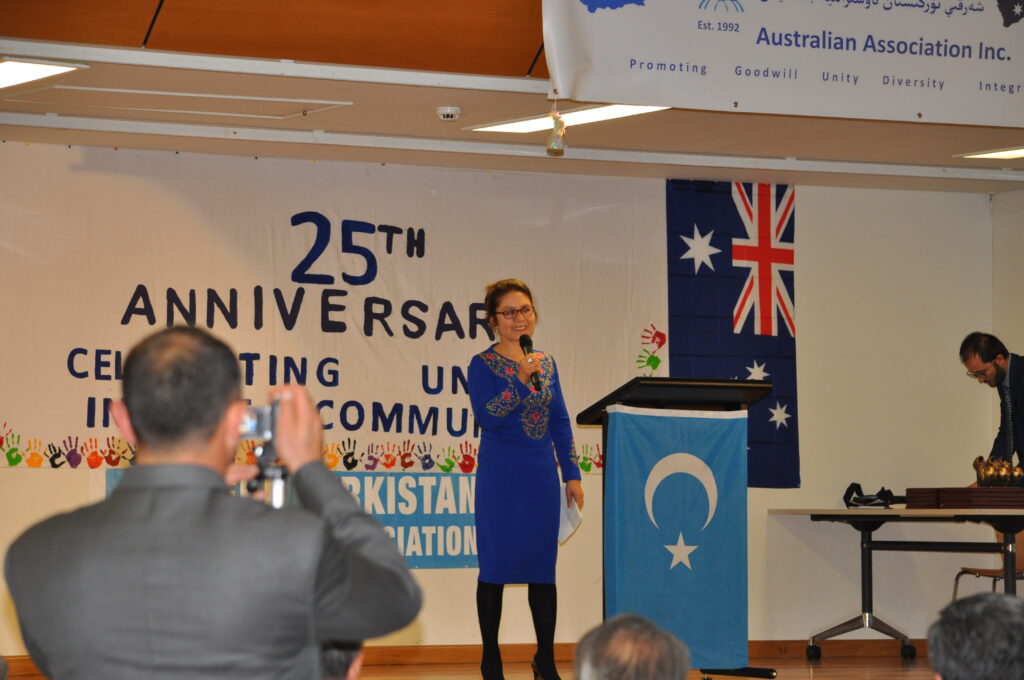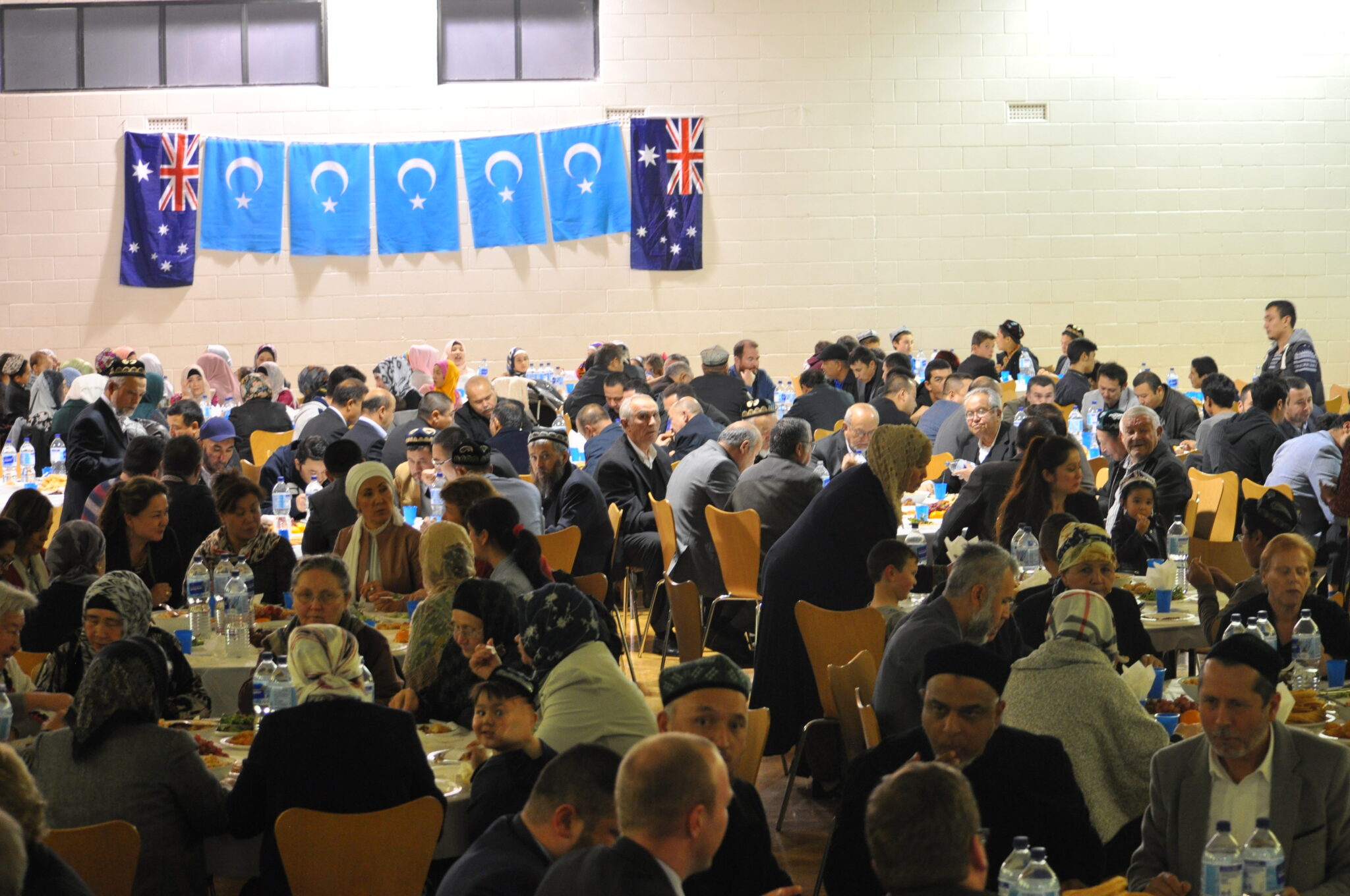The East Turkistan Australian Association Celebrates its 25th Anniversary

May 8, 2017
On the 29th of April Ms. Zubayra Shamseden spoke at the East Turkistan Australian Association’s 25th anniversary celebration.
It is a great honor for me to be here today to celebrate the 25th Anniversary of East Turkistan Australian Association Inc. (ETAA)’s establishment. It is also a great feeling to be ‘back home’ – in my second beloved country Australia, where I was privileged to experience a free and democratic society for the first time.
It is impossible to celebrate the tremendous success of the ETAA without high praise for those individuals, organizations, and supporters who have contributed or have continued to contribute for the last 25 years, whether they are here with us today or not.
Personally, I wish to pay my highest respect to the group of leaders who initiated the establishment of the Association: they are Mr. Muhammet Abdulla, Mr. Ahmet Igamberdi, Mrs. Suyun’gul Chanishef, Late leader Mr. Tahirjan Mahmodi, Mr. Yusuf Mezensoff and Mr. Alimhan Hasanoff. Also, our biggest volunteer community supporters at the time: Yoldash Ghoja Shalar, Turghan Abdulla, Akram Hashimajy and Mr. Muhammad Wali Hanifi from the Afghan community. Without all these community leaders and supporters’ devotion and tireless work at the beginning, the ETAA would not exist today.
Certainly, simply spreading the seeds or planting the tree is not enough for fruits to ripen with taste. There are countless community members, men and women, young and old, new and experienced, who continue to work for the development and improvement of the ETAA and everything it stands for.
I also wish to mention a few Australian government sectors and officials who believed in the ability and the future of the East Turkestan community in Australia, and who have continually supported us. It would not have been possible to create an East Turkestani community in Australia (‘East Turkestan’ is almost a holy name for Uyghurs) or the East Turkistan Australian Association without the recognition and acceptance of the Australian government. On behalf of our community, I wish to thank a few of those who worked closely with us throughout the years. They are the Multicultural SA, Department of Education, Wandana Community Center, Tea Tree Gully local council and the Migration Museum of South Australia.
Furthermore, without the close support of Mrs. Katrina Breffa from Ethnic Schools Board of SA, Department of Education, Mrs. Inter Rumper from Ethnic Schools of Association of SA, Multicultural Education Committee (an Advisory committee to the Minister) and the generous funding from the Department of Education of SA, an integral part of the Association, the Uyghur Language School of South Australia, would not exist or continue to provide excellent educational services to its community today.
Last but not least, the establishment of different cultural, religious and social activities under the umbrella management of the Association are also commendable. They are the Meshrep, which was established with the commemoration of ‘Ghulja Massacre’, which happened in connection with the cultural gathering of Meshrep in Ghulja on February 5, 1997. The soccer group, established to mobilize young members of community through sports activities. And the Tengri Tagh mothers group, established to mobilize mothers and young girls to contribute in community activities and networking.
Today, we have gathered to celebrate a truly inclusive and harmonious society in Australia. However, while we celebrate here, this very culture and community that has been able to thrive under a democratic Australian society, is facing extinction in East Turkestan under the Chinese communist regime. The Chinese government sees this very culture and religion as threat to its dictatorial regime. Therefore, I wish to briefly mention the religious persecution Uyghurs are facing today.
Uyghurs are subjected to severe and worsening repression of their freedom to practice their religion. The forms of repression are various. For example, as imams are the leaders of faithful Muslims, normally, they are required to deliver the divine message of God to its followers, however the Chinese government has restricted Uyghur imams from preaching the truth, instead forcing them to obey the rules of Communism and propagate government agendas in the mosques. Many imams are arrested and accused of ‘being wild’ due to disobedience to the instruction of the authorities. The humiliating show of repression has taken on ridiculous forms: local authorities force imams to dance in public squares, hold beer/alcohol drinking festivals during the month of Ramadan in the southern part of East Turkestan – the heart of Uyghur culture and tradition – display the Chinese flag inside mosques instead of where the Qiblah/prayer direction should stand, hang pictures of communist leaders on the walls of Mosques, force worshipers to go to specific government designated Mosques where Government appointed imams deliver prayer sermons, private prayers are strictly prohibited – if the authorities find out about Uyghurs praying in their own private house with family members and friends as a ‘jama’a’, those people are punished and accused of undertaking ‘illegal religious activities’. The paranoia of restrictions have gone far – according to a visitor who recently came to the USA from Urumchi, the Mosques are not allowed to use loud speakers to call ‘Azan’/call for prayer for Friday sermons.
The government has rules against Islamic dress for women and beards for men; Uyghur women are especially targeted by the government’s efforts to control religious expression, strictly enforcing rules against Islamic dress, preventing those wearing headscarves from entering hospitals, schools and government buildings, and sometimes forcing them to remove them before they are permitted on transportation. The Freedom House report also noted that “police increasingly approach women to enforce the rules, search homes based on informant tips, and fine violators” despite the fact that the rules of what articles of clothing are illegal are unclear.
Activities of the büwi, women who recite the Qur’an at religious gatherings and sing at shrine festivals, are also strictly controlled, and they are forced to undergo training by the authorities. Training involves ensuring that they understand their role in “safeguarding social stability” and “national unity,” as well their obligations to “obey state laws and regulations,” meaning enforcing the governments harsh rules on the practice of religion. Women are even barred from entering mosques, placing them in the same category as children under 18. It is more difficult for Uyghurs to go on Hajj than other Muslim groups in China, as it is difficult for them to obtain a passport. You may have read in the news recently that certain names that pertain to Islam have been banned as well, or how an Uyghur official was demoted for not wanting to smoke near elders, as this showed a lack of “resolute political stance” or a “commitment to secularization”.
I understand that today is not a time of sadness but celebration. However, the celebration that we are able to have in this free and democratic society is prohibited in the home country of this community. Therefore, I wish to call on the Australian government, and the organizations and individuals who are concerned with the universal value of human rights in communities of the lesser represented, voiceless people like Uyghurs and other Muslim minorities in East Turkestan – I would like to ask that you put pressure on the Chinese government when you have business interactions or other diplomatic or political dial ogs with them. The valuable community spirit you can see and enjoy here today in Australia is under great threat in East Turkestan under China’s brutal regime.
Thank you again for being here today, and congratulations to this community for withstanding the test of time and cementing itself as a part of the wider Australian community. I hope we can work together to achieve a better life for us here today and give back to Australian Society, as well as work for a better life for our family and friends back in East Turkistan. Thank you

